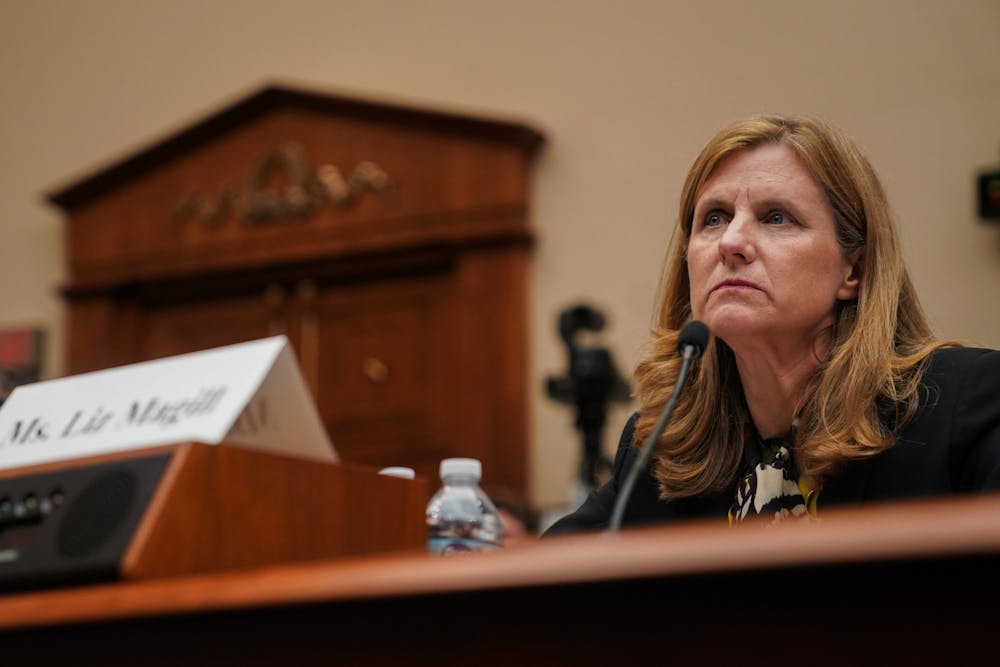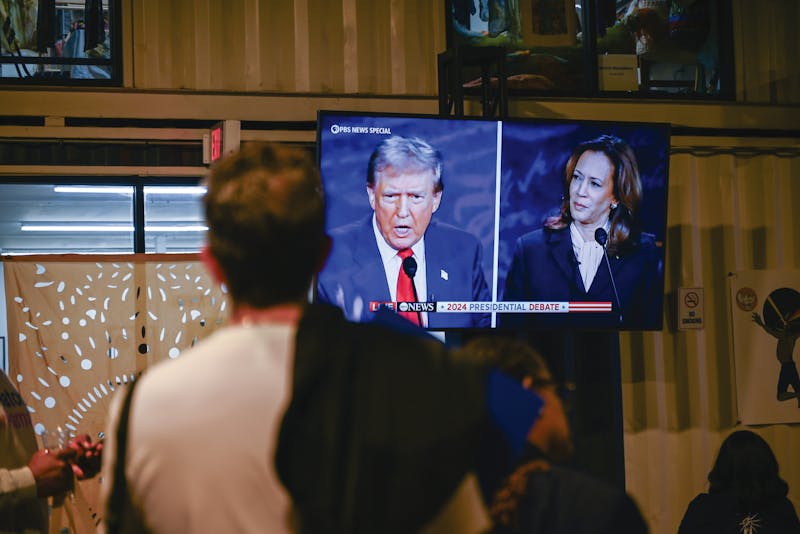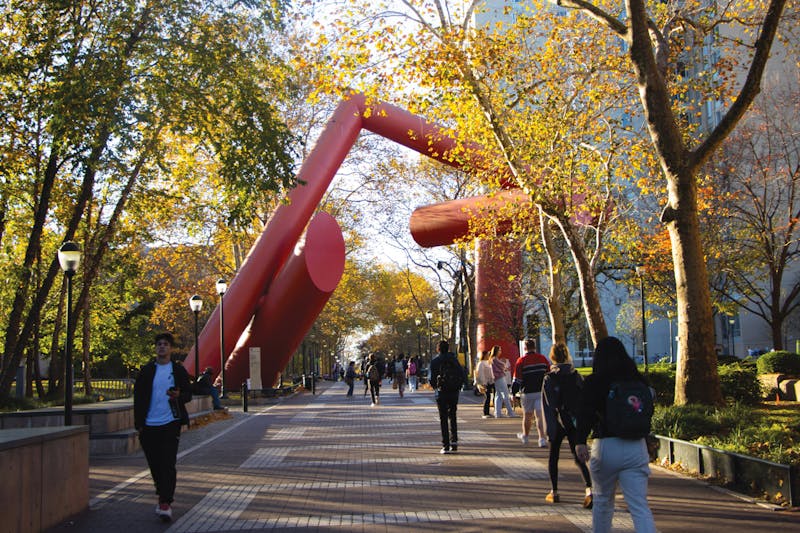
Last December, former Penn President Liz Magill resigned amid mounting pressure following her controversial testimony before the United States Congress about antisemitism on college campuses.
The Daily Pennsylvanian compiled the historic fallout from Magill’s resignation over the past year — one that can only be characterized by unprecedented campus unrest — from national scrutiny of the University and political fallout to increased student activism.
Donor response
Ahead of Magill’s resignation, dozens of prominent donors announced they would halt contributions to the University, citing concerns over the University’s response to the Israel-Hamas war, allegations of antisemitic incidents on campus, and the Palestine Writes Literature Festival. High-profile alumni and donors including Marc Rowan, Henry Silverman, and Jon Huntsman Jr. publicly criticized the University and senior administration.
The trend continued in the spring of 2024, when prominent Penn donors and alumni withdrew financial support, expressing dissatisfaction with the University’s response to campus protests, including the Gaza Solidarity Encampment.
Despite the donor backlash, the Penn Fund raised over $55 million during the 2024 fiscal year, marking the sixth consecutive year of record-breaking totals.
Congressional investigations
After Magill’s controversial testimony in December 2023, the U.S. House of Representatives Committee on Education and the Workforce began an investigation into Penn, Harvard University, and the Massachusetts Institute of Technology with the “full force of subpoena power.”
The Republican-led committee then released a 325-page report with the committee’s findings from its yearlong investigation on Oct. 31 revealing details about how the University handled disciplinary proceedings, Magill’s resignation, and pro-Palestinian campus protests.
In January, the House Committee on Ways and Means opened its own investigation into the University, asserting that its leadership has failed to comply with the anti-discrimination laws that make Penn eligible for tax exemptions.
On May 2, the speaker of the U.S. House of Representatives, Rep. Mike Johnson (R-La.), also announced that he was opening an expanded investigation that called a “House-wide crackdown on antisemitism” on college campuses.
Title VI lawsuit
A major question in the report released by the House Committee on Education and the Workforce — as well as its earlier investigations — centered around Penn’s compliance with Title VI of the Civil Rights Act of 1964, which prohibits discrimination based on race, color, or national origin in institutions receiving federal funding.
In February, Penn moved to dismiss a lawsuit brought by 2024 College graduate Eyal Yakoby and College sophomore Jordan Davis alleging that Penn violated Title VI of the Civil Rights Act of 1964 by subjecting them to a “pervasively hostile educational environment” that is discriminatory against Jews.
At the start of the 2024-25 academic year, Interim Penn President Larry Jameson announced the creation of a new Office of Religious and Ethnic Inclusion and cited its formation days later as evidence in the ongoing lawsuit. To date, Penn has filed three motions to dismiss the lawsuit.
Student demonstrations
The Gaza Solidarity Encampment, which began on April 25, stood for 16 days on College Green, stoking significant tensions on campus. The demonstration was ultimately disbanded on May 10 by the Penn Police Department and Philadelphia Police Department and resulted in the arrest of 33 individuals, including nine students. Since then, the University has maintained Allied Security presence and retained metal barricades on College Green.
Numerous events condemning violence against the Jewish community have also taken place on Penn’s campus. The Jewish community at Penn commemorated the one-year anniversary of the Oct. 7, 2023 Hamas attacks on Israel with events organized by Penn Hillel, Chabad House, and the Penn Israel Public Affairs Committee.
On June 6, Penn introduced the Temporary Standards and Procedures for Campus Events and Demonstrations, which banned encampments and revised rules on protest activities. The changes drew sharp criticism from pro-Palestinian groups and faculty members, who accused the University of suppressing dissent and violating open expression.
Antisemitism task force and task force on countering hate
At the end of May, Jameson shared the final reports from the University Task Force on Antisemitism and the Presidential Commission on Countering Hate and Building Community with the Penn community, calling for the University to clarify its position on boycotting, divestment, and sanctioning from Israel.
The task force also suggested that Penn commit to “incentiviz[ing] growth and strength in the broad area of Jewish scholarship” by expanding the curriculum and advised the University to clarify its open expression policies.
Magill announced the creation of the University Task Force on Antisemitism and the Presidential Commission on Countering Hate and Building Community in November 2023 to combat antisemitism and other forms of hate on campus.
Institutional neutrality
On Sept. 10, Jameson announced that Penn would limit statements on local and world events in a major move toward institutional neutrality. Jameson claimed that the new policies aim to protect the “diversity of thought” central to the University’s mission.
The shift to the new policy, which Penn initiated several years ago, will limit the University’s role in commenting on controversial issues that do not directly relate to it.
Sanctions against Amy Wax
In late September, Penn upheld sanctions against University of Pennsylvania Carey Law School professor Amy Wax following her history of discriminatory remarks and two years of disciplinary proceedings with little precedent.
The sanctions mark the first time in recent history that a tenured University professor has been sanctioned through Faculty Senate procedures. The DP previously reported that the recommended sanctions against Wax included a one-year suspension at half pay, the removal of her named chair and summer pay, and a requirement for Wax to note in public appearances that she is not speaking on behalf or as a member of Penn Carey Law.
Shared Governance
Penn faculty voiced growing concerns about the decline of shared governance at the University, alleging that faculty input has been sidelined in favor of administrative and financial priorities. While Penn historically emphasized shared governance as a collaborative decision-making model, recent controversies, including leadership turmoil and trustee influence on policies, have deepened frustrations.
Faculty criticized Jameson for weakening governance structures and described their role as “purely advisory.” Some highlighted systemic issues, including lack of transparency, limited access to senior administrators, and the prioritization of wealth over academic values.
The Daily Pennsylvanian is an independent, student-run newspaper. Please consider making a donation to support the coverage that shapes the University. Your generosity ensures a future of strong journalism at Penn.
Donate










